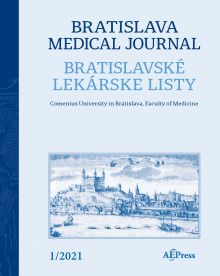Journal info
|
||||
Select Journal
Journals
Bratislava Medical Journal 2024 Ahead of print 2023 2022 2021 2020 2019 2018 2017 2016 2015 2014 2013 2012 Endocrine Regulations General Physiology and Biophysics Neoplasma Acta Virologica Studia Psychologica Cardiology Letters Psychológia a patopsych. dieťaťa Kovove Materialy-Metallic Materials Slovenská hudbaWebshop Cart
Your Cart is currently empty.
Info: Your browser does not accept cookies. To put products into your cart and purchase them you need to enable cookies.
Bratislava Medical Journal Vol.124, No.4, p.292–303, 2023 |
||
| Title: Anti-proliferative effects of beta-blocker propranolol on human lung cancer and noncancer cells | ||
| Author: Menderes Yusuf TERZI, Meral URHAN-KUCUK | ||
| Abstract: OBJECTIVE: Propranolol (PRO) has been recently discovered to possess anti-tumorigenic effects in cancer patients. So, we aimed to enlighten the in vitro effects of propranolol in A549 lung cancer cells and BEAS2B nontumoral lung cells. METHODS: The gene expression levels of apoptotic proteins; caspases 3, 8, and 9 (CASP3, 8, 9), apoptosis inducing factor (AIF), and DNA damage inducible transcript 3 (DDIT3) and cell cycle regulatory proteins; WEE1 G2 checkpoint kinase (WEE1) and cyclin dependent kinase inhibitor 1A (CDKN1A) were analyzed with quantitative reverse-transcription PCR to assess the effect of PRO on A549 tumor and BEAS2B nontumoral cells. The protein levels of caspase 3 and AIF1 were detected with Western blot. RESULTS: PRO exerted its anti-tumorigenic effects against A549 cells by arresting cell cycle via CDNK1A and by inducing apoptosis via caspase-dependent (CASP3) and -independent pathways (AIF, DDIT3). As to nontumoral BEAS2B cells, PRO decreased the cell viability at a lesser extent compared to tumoral cells. In contrast to tumor cells, PRO reduced the protein levels of CASP3 and AIF1. Notably, at 48th hour of PRO treatment, we observed a sustained expression of elevated DDIT3 mRNA levels at 24h in BEAS2B cells unlike in A549 cells. CONCLUSION: We suggest that DDIT3 and CDKN1A play a critical role during cell fate decision after PRO treatment by protecting nontumoral cells against apoptosis and by triggering apoptosis in tumor cells. The selective action mechanism of PRO with less cytotoxicity in nontumoral lung cells puts it forward as a promising adjuvant agent in lung cancer therapy (Tab. 1, Fig. 4, Ref. 50). Text in PDF www.elis.sk |
||
| Keywords: propranolol, BEAS2B, A549, lung cancer, apoptosis, DDIT3 | ||
| Published online: 04-Jan-2023 | ||
| Year: 2023, Volume: 124, Issue: 4 | Page From: 292, Page To: 303 | |
| doi:10.4149/BLL_2023_045 |
||
|
|
 download file download file |
|

